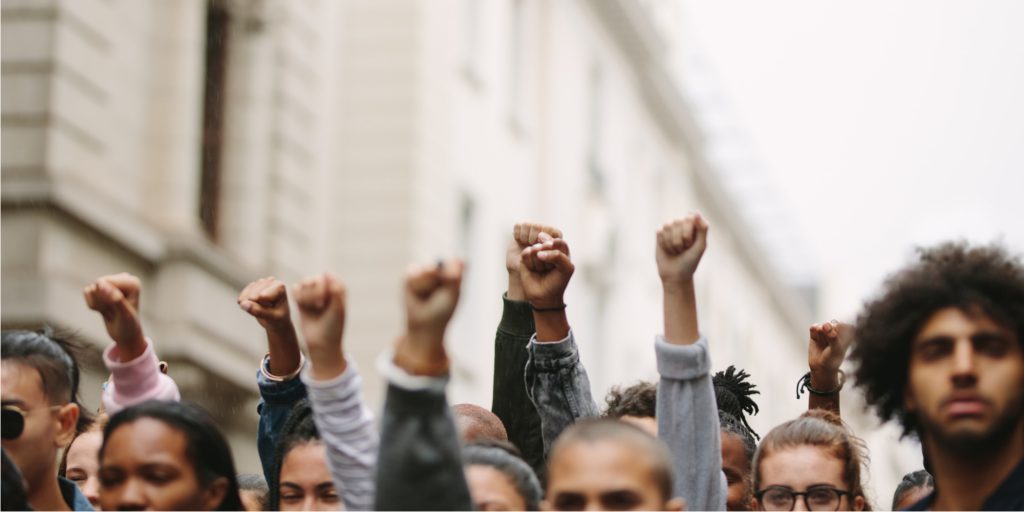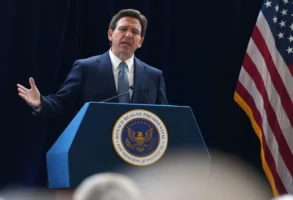
Published July 30, 2021
If you care about the battle over critical race theory (CRT) in the schools, you need to know about Bettina Love. The Biden administration recently got caught promoting a guidebook from her group, the Abolitionist Teaching Network (ATN). The booklet asks teachers to “disrupt Whiteness and other forms of oppression.” Following that revelation, the administration disavowed ATN and claimed that touting its program had been an “error.” Almost certainly, however, Biden’s support for Bettina Love’s ATN was no slip-up. Bettina Love is all the rage among progressive educators (i.e., the entire education establishment), including leading members of Biden’s Education Department. Love may be less well known to critics of CRT than Ibram X. Kendi, Nikole Hannah-Jones, or Robin DiAngelo, but that is our mistake.
Love’s 2019 book, We Want to Do More Than Survive, is arguably the single most comprehensive and up-to-date guide to the ideology of the CRT movement in education. Diving into Love’s highly readable and stunningly radical book clarifies, and in some cases virtually decides, a number of live controversies: Is CRT just an obscure and irrelevant legal theory, or is it actively shaping educators and schools? Is CRT Marxist? How should we understand the Left’s new interest in civics and so-called media literacy? What is CRT’s attack on “Whiteness” all about?
We need to consider Love’s answers to these questions, not only because her book is an extraordinary document, but because there is no way the Biden administration can successfully disavow Bettina Love or her group. Love’s ideas are so popular with the progressive “civics” community — including Biden’s own political appointees — that the massive federal civics bills now pending in Congress will fuel her crusade, whether her group gets federal money directly or not.
We Want to Do More Than Survive, the title of Love’s book, alludes to a saying of Maya Angelou: “My mission in life is not merely to survive, but to thrive.” Who can argue with that? A more accurate title — say, We Need a Socialist Revolution — would have been a tad more contentious. Yet somehow the book manages to move from “thriving” to revolutionary socialism. The connection comes from Love’s life story.
Although her family was not religious, Love spent her early years in Catholic school. The nuns believed they were helping their students, but their rhetoric of colorblind liberalism left Love feeling cold and lost. (Today, Love views the nuns’ colorblindness as actively “anti-Black.”) Everything changed when Love joined an after-school program run by a leftist college student. Dissatisfied by tame liberal stories of Martin Luther King Jr. and Rosa Parks, Love’s activist teacher tutored his charges in the radical thought of Angela Davis, Malcolm X, and the Black Panthers. Love and her fellow students were being groomed as radicals, and, beyond a doubt, it worked. Till then, Love tells us, she had been operating in mere survival mode. Once she joined this small group of young blacks militantly resisting the crushing power of a racist society, her life turned around. At long last, Love was thriving.
The book’s argument pivots around this moment. Love brands standardized testing and the usual battery of education nostrums as the “educational survival complex.” That edifice of mere survival must be dismantled and replaced, says Love, by an “antiracist” pedagogy in which test scores and grades take a back seat to fighting systemic oppression. Only participation in a movement of societal transformation can allow our young people — and minorities in particular — to thrive, says Love.
Her book’s subtitle, “Abolitionist Teaching and the Pursuit of Educational Freedom,” supplies the name of Love’s “Abolitionist Teaching Network.” So, what does Love hope to abolish? Plenty. The educational survival complex must go, as we’ve seen, but also the prison-industrial complex, and pretty much every other pillar of the existing social order, including capitalism. Most especially up for abolition is “Whiteness.” At base, Bettina Love wants to abolish America itself and replace it with an entirely different system.
Love relentlessly attacks this country as a “spirit murderer” of minority children, and worse. Her book opens with an indictment of America by W. E. B. DuBois in which he suggests the need to abandon and replace America’s fundamental “goals and ideals.” Later in the book, Love quotes approvingly from the work of writer Robin D. G. Kelley to clarify her own view of America. Love embraces Kelly’s praise for that tradition of political radicalism that “cannot be traced to the founding fathers or the Constitution or the Declaration of Independence.” Along with the Constitution, Love clearly hopes to overturn the “Eurocentric, elitist, patriarchal and dehumanizing structures of racial capitalism and its liberal underpinnings.” The unmistakable implication of this, and much else in Love’s book, is that her ultimate goal is the abolition of America itself. That is, Love wants to replace our constitutional system, and the classical liberalism that helps ground it, with a society built on radically different “goals and ideals.”
Along with America’s core political structures, Love aims to revolutionize our character. She disdains the efforts of educators and policymakers to instill in “dark children” traits like problem solving, zest, self-advocacy, grit, optimism, self-control, curiosity, and gratitude. Love considers education designed to encourage character traits like hard work, discipline, and personal responsibility to be anti-Black. In its place, she wants an education in civics, although not the sort of civics you may be thinking of.
Civic education that teaches children to “pay their taxes, vote, volunteer, and have good character” is rejected by Love as “code for comply, comply, comply.” “History tells us,” Love says, “that dark folx’ humanity is dependent on how much they disobey and fight for justice.” In consequence, Love enthusiastically embraces the practice of “action civics” (what I call “protest civics”), now all the rage on the left. Civics, to Love, means launching protests and acts of civil disobedience aimed at dismantling and abolishing racism, sexism, homophobia, transphobia, Islamophobia, classism, mass incarceration, U.S. Immigration and Customs Enforcement (ICE), and, ultimately, the American system itself. So, when Love says “civics,” she refers to something utterly opposed to the original meaning of the term.
So-called media literacy is a big part of the protest-civics package, and Love embraces this as well. In fact, her faculty webpage lists media literacy as one of her academic specialties. Supposedly, media literacy helps students distinguish “fake news” from reliable information. In the hands of Love and others like her, however, media literacy is one more tool for politicizing students. Love’s writings prior to We Want to Do More Than Survive focused on “Hip-Hop-Based Education.” While Love grants that hip-hop lyrics may often send the wrong message, she claims that media-literacy coursework on the evils of our racist, sexist, homophobic, classist, and overly commercialized society can remedy the problem. With a little help from a good media-literacy curriculum, hip-hop can be converted into a powerful tool of political resistance, Love claims.
For Love, “civics,” understood as agitation for system transformation, is the very core of education itself. “Abolitionist teaching,” she says, “is not a teaching approach: It is a way of life, a way of seeing the world, and a way of taking action against injustice.” When Love lists real-world examples of “abolitionist teaching,” they nearly all turn out to be political protests: a mass student walkout to protest President Trump’s DACA order; the walkouts for gun control organized by David Hogg and the Parkland students (heroes to the action-civics community); school districts organizing a “week of action” in support of Black Lives Matter, etc.
Notably, after providing a long list of school-based protests, Love ends with an example of abolitionist teaching that has nothing to do with schools per se. She lauds Jackson, Miss., sometimes called “America’s most radical city,” for organizing a “cooperative commonwealth” built around “workers’ power, environmental sustainability, and socialism.” Here is where the politics that so obviously permeate her book receive a name.
Critical race theory derives from Marxism, but treats race as Marx once treated class. Love shows that the CRT-Marxism connection is more than just an historical “gotcha,” and also less than a total transformation. Race does function in Love’s framework as class once did for Marx. “Dark folx,” in her terminology, are the new proletariat. Oppression lends dark folx unmatched insight into the evils of America’s system, thereby marking them as proper leaders of the movement to overturn it. Yet capitalism remains a target for Love, and socialism is clearly her answer. We might call Love’s version of CRT, “race-inflected Marxism.”
But is Love actually practicing “critical race theory”? You bet she is. If you think CRT is just an abstruse legal concept erroneously used by conservatives to identify a contemporary education movement, you are mistaken. CRT has been a force in education circles for a quarter century. Love’s book draws on the extensive CRT education literature, and contributes to it as well. In fact, Love devotes an entire chapter to CRT, which she calls her North Star. CRT, for Love, is the indispensable guide to abolitionist teaching. You could say that Love thinks of her abolitionist education movement as CRT brought to life.
Love herself is a CRT trainer, using the theory to uncover the racism allegedly permeating every element of American society. Because it exposes and debunks “the normalization of the White worldview,” Love also recommends free CRT therapy for teachers. Educators — especially white educators — need CRT therapy, says Love, to understand why recovering from Whiteness is so hard.
Ah, “Whiteness.” Love’s book is a veritable font of knowledge about Whiteness and how to abolish it. According to Love, the white teachers who attend her CRT training sessions often feel uncomfortable. I believe her. There is no easy cure for Whiteness. Love condemns white flight to the suburbs, as well as white gentrification of cities. That does tend to reduce the options on your next move. Love identifies schools as “spaces of Whiteness and White rage.” But what precisely is her cure?
Love’s prescription for the abolition of Whiteness goes something like this: Whites must come to recognize that they are “living a racialized life and . . . having racialized experiences every moment of every day.” Only then can whites speak of justice. More specifically, whites must come to terms with the role played by violence in maintaining Whiteness. That, in turn, requires accepting that their successes in life are merely by-products of Whiteness, and of the violent means used to uphold it.
So, will recognizing all of this finally free up white people from their Whiteness? Not quite. According to Love, “White folx cannot lose their Whiteness; it is not possible.” Yet there may be another way out. Overwhelmed by the guilt and shame they encounter with the help of CRT, white people may ultimately get free of those emotions by acting in solidarity with dark folx in the fight for justice.
Even then, however, daunting challenges remain. According to Love, “Whiteness cannot enter spaces focused on abolitionist teaching. Whiteness is addicted to centering itself, addicted to attention, and making everyone feel guilty for working toward its elimination.” In other words, whites must act in political solidarity with dark folx, yet without taking over the movement. Essentially, whites must support the leadership of dark folx, while surrendering their power and position so as to make that happen. All the while, they must remember that their whiteness can never be truly transcended.
Some might call all of this bigotry. They would be right. In any event, Love’s approach is — very explicitly — an application of critical race theory to the world of education, and beyond.
The publication of We Want to Do More Than Survive in 2019 made Bettina Love a star. She may not enjoy the recognition that national bestseller status has brought to Kendi and DiAngelo. Within the education universe, however, Love is highly influential. Since 2019, she has been a regular contributor to Education Week, the forum of America’s education establishment. Her work now shapes “antiracism” initiatives and curricula at colleges and schools of education across the country, not to mention K-12. As a professor of education at the University of Georgia, Love’s book success enabled her to co-found the Abolitionist Teaching Network in July of 2020, and to speak and consult widely on its behalf since then. ATN, which essentially promotes the program and ideology outlined in Love’s book, held its first national conference earlier this month.
Love is also a favorite of the educators working overtime to press protest civics and media-literacy programs on every state in the Union. The anti-racism resource page at Illinoiscivics.org, the nationally influential flagship site of the Left’s CRT-friendly “civics” community, features one of Love’s Ed Week pieces, along with the very same ATN guidebook the Biden administration got into trouble for promoting. The creation of that resource page was supervised by Shawn Healey, now a national leader of the CivXNow coalition, the most influential backer of several federal bills designed to effectively nationalize America’s civics curriculum.
In other words, if Biden and the Democrats pass a federal civics bill, Bettina Love’s work — and the work of many others who share her politicized vision of protest civics and so-called media literacy — could soon be imposed on the states. That could happen whether Love’s Abolitionist Teaching Network is directly funded by the feds or not. Federal funding for her many prestigious friends and supporters in the leftist “civics” world would be enough to spread Love’s work far and wide. And again, Love, is indicative of a perspective broadly shared by leading figures within the leftist “civics” community. Nearly everyone promoted by the “new civics” movement will be on board with some combination of protest civics and CRT. Love is just more open than most about the nature of that shared agenda.
Since the Biden administration was caught promoting ATN’s attack on “Whiteness,” a series of reports from Fox News have suggested that, despite disavowals, that was no mistake. Top Education Department officials have ties to Bettina Love. The Biden Education Department clearly loves CRT, and that is the important point. The department’s supposed retreat from CRT in its priority criteria for grants in history and civics is smoke and mirrors. So is its disavowal of Bettina Love.
If congressional Democrats manage to pass one of their pending “civics” bills, it will be easy for the Biden administration to route that money to advocates who will not only push the work of the Abolitionist Teaching Network, but many other versions of protest civics and CRT. How, exactly, can Biden’s Education Department do all that? I’ll have more to say on that in the not-too-distant future.
Stanley Kurtz is a senior fellow at the Ethics and Public Policy Center.
Stanley Kurtz is a Senior Fellow at the Ethics and Public Policy Center. Beyond his work with Education and American Ideals, Mr. Kurtz is a key contributor to American public debates on a wide range of issues from K–12 and higher education reform, to the challenges of democratization abroad, to urban-suburban policies, to the shaping of the American left’s agenda. Mr. Kurtz has written on these and other issues for various journals, particularly National Review Online (where he is a contributing editor).








